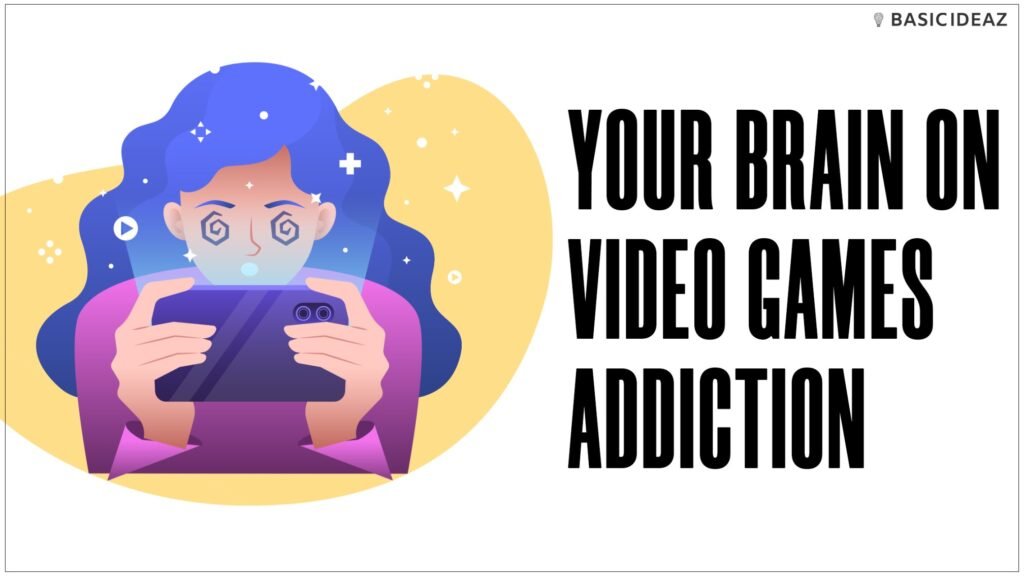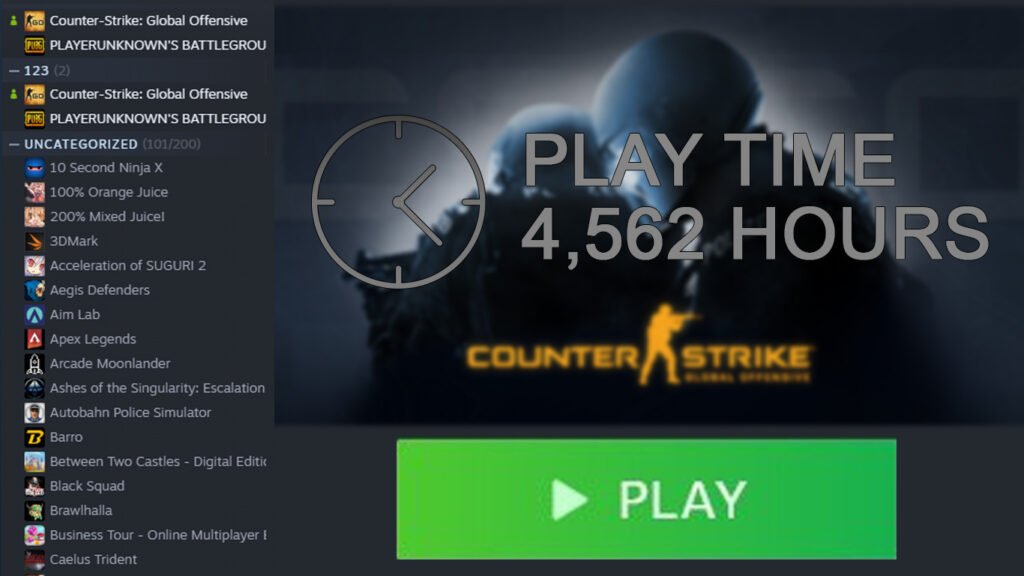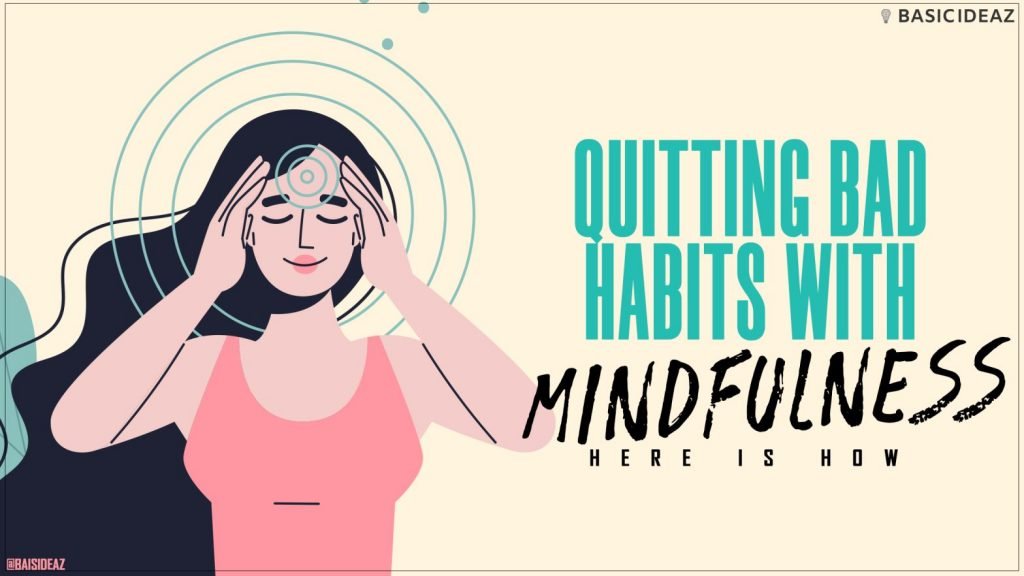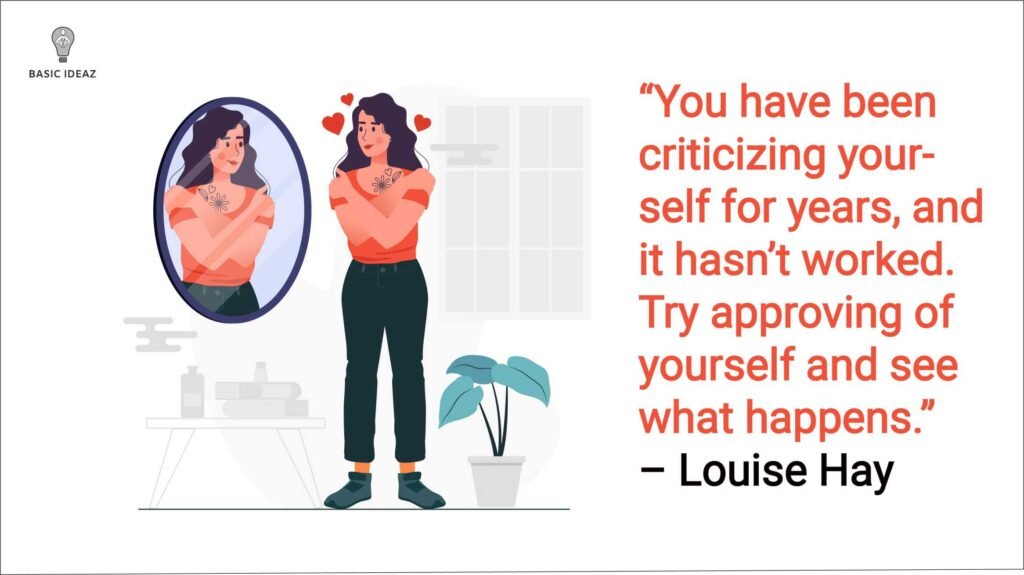Your brain on video game addiction- Dopamine exhaustion

- I don’t have a video game addiction.
- I can stop playing video games whenever I want.
- Why should I stop playing video games? It is not harming me.
- I play video games because it is fun, relaxing and I can hang out with my friends.
- In truth, I play video games so that my mind can be busy with something else and not face the reality. Reality is ugly and cruel.
- Every night I promise myself that I will quit video games from the next day and focus on my work, but I never keep my promises.
- I feel horrible after I waste a day playing video games. Am I addicted?
- My life is so messy, I can’t deal with it. I need a break and video games make me happy.
- I have social anxiety, but I can talk to anyone while playing multiplayer and I like it. It is way easier.
- And what is dopamine exhaustion?
Get Quality Self Improvement Articles Every Week, No Spam, No Ads.
Thank you!
You are added to the community of Basicideaz.
These are the common statements we make while we are facing unhappiness in our lives.
Most of the time we get confused between pleasure and happiness.
We think both are the same, but they aren’t.
Pleasure comes from surrendering to our impulses and happiness comes from our values.
For example, eating your favorite cake will give you pleasure, not happiness.
On the other hand, if you value your health, maintaining a diet everyday will give you happiness not pleasure.
The same is true for video games.
Playing video games with friends will give you pleasure but if you value your career and work, working instead of playing will make you happy.
But our brains crave pleasure, the hit of dopamine, the immediate gratification and if we are unaware of our impulsiveness, it becomes very difficult to stay away from pleasure.
This is what happened to me.
Once there is dopamine exhaustion, we lose interest in all the activities.
We will talk about dopamine exhaustion in detail later.
But first, let me tell you my story about video game addiction.
Personal history with my video game addiction.
I started playing games in the 2000s. My brother’s friend introduced us to video games for the first time.
After crying and begging for a month, my father finally agreed to buy us a TV video game consisting of a white keyboard, joystick, a gun to shoot ducks on tv, and a few cassettes.
I and my brother had the best time of our lives.
We played contra, super Mario, road rash, etc but soon everything changed.
I got introduced to pc games.
I started with story mode games like IGI, Crysis, call of duty, and the list goes on.
The joy of playing these games was unreal. I went to bed with excitement that I would be playing video games the next day.
I fell in love with the first-person shooter and their stories.
But again, the college started and there came a big gap of five years.
The interest in the video was not there anymore. I mean if there is a good pc, I would like to play but there was no urge for it.
After college, I knew what I was going to do with my life. I found my passion in writing horror stories and dreamt about becoming a novelist.
I also had an interest in music. I bought a guitar and started practicing every day.
Life was good until one day, for no reason, I told my brother to buy PUBG PC, a competitive online game in 2018.
This was my first introduction to online competitive games.
After this, I switched to another competitive online game, called CSGO. I fell in love with CSGO and from here, the downward curve of life started.

If you can relate this:
For some reason, I wanted to be better at this game. I was dedicated and played every day for like, 11-14 hours.
I watched tutorials, other streamers, and tried to find every possible way to become the best in CSGO.
I never thought about why I was trying so hard. (Hint: Getting the dosage of high dopamine hit everyday, until I experience dopamine exhaustion)
I knew I was wasting my time and creating a big gap between my dreams and myself but I couldn’t stop it.
In truth, I wanted to read stories, I wanted to write stories, watch movies, and learn the craft of writing. But for some reason( dopamine exhaustion ) , whenever I tried to study or write, I didn’t feel like doing it.
I felt low and hopeless and because of this, I played even more.
Playing CSGO made me happy and relaxed. It creates a sense that everything is alright. I always told myself that I can start my reading and writing the next day.
By the end of 2019, I was able to quit video games after knowing what was happening in my brain.
I became productive.
I started my blog, I wrote three published short stories. I started focusing on my health and the lost happiness was returned.
My self-esteem grew.
But, this triumph was short-lived too.
In March 2020, I told one of my gaming friends to play video games for just one day.
I don’t know why I did that.
I guess I forgot how frustrating it was not having the internal motivation for my work.
That gaming friend introduced me to a new game, called Valorant and the following thing happened in the next six months:
- I played every day for 9-10 hours.
- Felt horrible and cursed myself for wasting one more day.
- Lost interest in my writing and reading.
- Lost interest in almost all the other activities.
- Developed social anxiety and remained inside my room most of the time.
- Avoided phone calls, relatives, and parents.
- Remained angry most of the time.
- Tried to quit every night, but I kept returning the next day or after a gap of two-three days.
- I felt inferior to everyone else in the world.
- Lost the girl I love.
In simple words, I lost my passion for living.
But wait, the story has a happy ending or a new beginning because without that I would have not been able to write this article.
I, of course, quit video games eventually.
How did I stop playing video games? What was the effect of quitting video games in my life?
Before I answer that, let’s understand the effect of video game addiction on our brain.
The three phases of video game addiction.
Phase 1
This is the phase where we are starting with a new video game. We enjoy it, have fun, and the excitement rises everyday.
If it is an online competitive game, like CSGO or Valorant, we strive every day to become better at this game.
This is the normal phase and it doesn’t affect our mental health.
We are just having some good times.
Phase 2
In this phase, we play the same game but we are unable to find that happiness or the euphoria that we experienced in phase 1.
The level of satisfaction is less but we still play every day in the hope of that euphoria.
We still strive to become the best, but it is not that exciting anymore.
Moreover, if we do not play the game, we feel low or unhappy. We say to ourselves that something is not right.
When we try to become productive or want to do things that are important to us, we don’t feel motivated and our mind starts craving for that particular video game.
We say, “Just one more day and from tomorrow I will be truly productive.” Unfortunately, tomorrow never comes.
This is the phase where video game addiction starts to surface in our life.
This happens because we have created a strong link to our brain.
The link is, Whenever we feel sad or low, we play that video game to make ourselves happy.
But, the irony is the more you play, the more awful you feel by the end of the day, and the more awful you feel, the more you play.
The cycle continues.
Phase 3
This is the phase where you feel the only thing that can make you happy is that video game. You don’t feel like going out or talking with anyone.
You already know that playing that video game is bad for your mind and health, but you can’t stop yourself.
There is no control over your impulses now.
Though playing this video game doesn’t make you happy or relaxed, you still play every day.
It is because of the anticipation of happiness and excitement that you felt before, make you come back and play this video game over and over again.
It is because experiencing the ‘low’ for not playing the video game, keeps bringing you back.
In this phase, you probably lose your job, fail in your relationships, cry in bed at night, affect your mental and physical health, and promise to quit it every night before sleeping.
Maybe because of willpower, you can quit if for a few days, but you relapse every time.
This is the phase where you are addicted to video games.
This is the phase where we all experience dopamine exhaustion.
But, what is the science behind video game addiction?
- Why are video games so addictive?
- What goes into our brain while playing video games?
- And, how to stop playing video games?
The science behind video game addiction is the works of our neurotransmitters in our brain.
One of the major neurotransmitters that play an important part in forming video game addiction is dopamine.
Get Quality Self Improvement Articles Every Week, No Spam, No Ads.
Thank you!
You are added to the community of Basicideaz.
When dopamine is released?
Dopamine, also known as the pleasure molecule, is a future-oriented chemical. It means, dopamine releases on future anticipation of rewards, and not in the present while performing an activity.
It is the uncertainty of rewards that releases dopamine.
Our brain craves the unexpected and keeps making predictions about what is going to happen next.
- How much money are we going to make in this quarter?
- What will happen when you propose to her?
- Who will win the finals?
- What time will you leave the office?
- What is going to happen on your birthday?
When something happens that is more than your prediction, then it is literally an error in your future forecast.
This happy error is what releases dopamine into action.
The scientists who studied this phenomenon called it ‘reward prediction error’.
In simple explanation: The mere possibility of a reward prediction error is enough to trigger dopamine into action.
Whenever dopamine is released, we feel a burst of energy and motivation to perform a particular task.
Video games release a huge rush of dopamine because, in the world of video games, we keep predicting rewards in every step.
- The excitement to play with friends today.
- The excitement to reach a new level in the game.
- The excitement of what is going to happen in the next round?
- The excitement of becoming the best in the game?
In the world of video games, there is an infinite number of possibilities.
What happens when dopamine releases?
The number one priority of our brain is survival.
According to our brain, happiness or pleasure is the strongest indicator of survival.
Keeping the above information in mind, dopamine releases do the following in our brain:
- Whenever an activity makes us happy or releases dopamine or other happy chemicals in our brain, it marks that activity as important for the future.
- Moreover, when we repeat the same activity over and over again, the neural pathways in our brains get stronger for that particular activity.
- When a neural pathway gets stronger for a particular activity, we become better at that activity. The activity becomes more fun to do. It becomes a habit or addiction.
Video games release a huge rush of dopamine that creates stronger neural pathways in a shorter time frame.
These pathways create huge urges to play video games over and over again, because according to the brain, playing video games is important for our survival.
The dark side of dopamine
The above information about dopamine is what happens in phase 1 of video game addiction.
The novelty of video games and the reward prediction error makes us excited and happy in phase 1. But, this is temporary.
Soon in phase 2, as mentioned above, we start to lose interest in that video game.
The happiness and joy that we felt in phase 1 start to diminish in phase two.
The dark side of dopamine is, once the prospect of the future event starts to become familiar, the release of dopamine goes down and eventually stops.
It never releases the same level of dopamine hit with the same old information.
Our brain craves new information every time.
So, why do we still play if it is not fun anymore?
There are two reasons:
- We still play video games with the expectation of getting that dopamine hit that we once experienced in phase 1.
- If we do not play video games in phase 2, we experience the ‘low’ of not getting the regular dopamine hit that we are used to.
Low creates a sense of sadness in yourself. It feels harsh and it makes you feel like something is not right and the world is a sad and desolate place.
To skip the low, we go back to our video game that, at least, keeps us neutral.
Dopamine Exhaustion
So, what is dopamine exhaustion?
In phase 3, there will be no dopamine or any other happy chemicals to make us happy.
But, because of the strong neural pathways we have created, we become so addicted to video games that we cannot live without them.
In this stage, we feel fatigued with or without playing video games. We lost interest in all other activities.
This is the stage where most gamers plunge into depression, negative thoughts, career problems, relationship problems and they are unable to deal with it.
This is the stage where there is no motivation to wake up in the morning, no motivation to smile.
The state of this stage is known as Dopamine exhaustion.
Dopamine exhaustion can lead a person to depression, losing focus in career, mental illness, stress, etc.
The anticipation of enjoyment or pleasure that we felt in the early stages kept us hooked without any further pleasure.
There is no new information from video games and there is no reward prediction error.
We say, ‘everyday same old, same old.’
Though we try our best to quit video game addiction, we fail over and over again.
Perhaps, we may quit it for a day or two or maybe a week, but we eventually return.
In this phase, we generally need outside help to cope with our addiction.
The neural pathways are so strong that it impedes our logical thinking and willpower.
There is no control in us and we generally run our lives on impulses.
‘How to quit video game addiction’ is a big topic and I will write about it in my future articles.
What happens when we quit video games?
When we quit video games, our dopamine imbalance starts to become normal again.
We can see the effect in just one week.
Though, it may take two to three months to completely free yourself from video game addiction.
Below is a one-month timeline after quitting video games.
*It is not 100% accurate for everyone because everyone’s video game addiction level is different. Some of us have been playing video games for a year where some are playing since childhood.
But, the data I have collected from fellow video gamers and online research, including my timeline, are summarised below:
Week 1:
- The desire to play video games will be very strong.
- There will be strong urges that will impede your logical thinking.
- You will feel very low. It will seem like something is not right with the world and you are missing something very important.
- The stress level will go up.
- Your attention to focus on anything will greatly decrease and you will think a lot.
- By the end of the first week, you will feel a bit happier and calmer.
- Your impulsive behavior will increase in other areas like watching youtube videos or Instagram.
- There will be a lot of time when you will think, maybe this is not working and quitting video games was a mistake.
Though, all these negative symptoms were temporary.
By the start of the second week, you start to feel more controlled of yourself.
Week 2.
- There will still be urges to play video games but, it will be lower than the first week.
- You will find joy in small activities like taking a walk.
- The constant rush in your head will start to slow down and you will be more peaceful.
- Your productivity level will go up and you will find that missing passion and happiness starts to return.
- Your self-esteem will start to grow.
- You will start to feel a deep respect for yourself.
- There will be high-stress levels this week too.
- Your focus on your life will greatly improve.
Week 3 & 4.
- There will be a few who will have a flatline in their timeline. Flatline is a period where you lose interest in all your activities.
- Your emotions become flat and you neither feel sad nor happy.
- A lot of gamers get scared in this stage thinking quitting video games makes them emotionless, but all you need to remember is flatline is temporary.
- This happens because our brain is rewiring.
- The neural pathways that we have created by repetition start to become weaker and shrink.
- Once the neural pathways for video games shrank, the urge for playing video games goes down.
- The strength of flatline depends on your video game addiction length. Since, how many years have you been playing video games? Moreover, most of us don’t feel the flatline.
In simple words, once you quit video games, you will start to enjoy the little things in your life. You will find your passion back for your work.
Your social anxiety will start to disappear as your self-esteem will grow. You will start to connect with people and become happier.
So, as I mentioned above, there is a happy ending to my story.
I successfully quit video game addiction.
Though I still play video games on weekends with friends, because I believe gaming is not the problem, but falling to our impulsive behavior is.
When you surrender yourself to your stimulus/ impulsiveness, you cage your freedom to your emotions.
No one is happy when they are caged.
Conclusion
The definition of addiction may be different for everyone. If I don’t want to do something but I still do it, every day or once in a month or once in a year is an addiction for me.
Why will I do something if I don’t want to do it at all?
I also believe playing video games is healthy, but when it is under your control. When it doesn’t affect your personal life, your social life, and your professional life.
Playing video games is indeed highly addictive, but at the end of the day, it is always you who have to shape your life.
See if you have a video game addiction. Is it affecting your life in any way? Is it worth it to play video games everyday?
If it is, then you keep playing, if it is not, you need to do something about it.
Best
Ahbab
Sources of this article*
- HealthyGamer: Great website for video game addicts.
- Habits of happy brain by Loretta Graziano Breuning






Pingback: 10 Negative Effects of Video Game Addiction | Online competitive Games. - Basic Ideaz